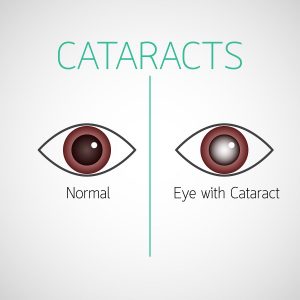 Cataracts, characterized by the clouding of the eye’s natural lens, affect nearly 22 million Americans age 40 and older. According to the National Eye Institute, more than half of all Americans will have developed the disease by age 80.
Cataracts, characterized by the clouding of the eye’s natural lens, affect nearly 22 million Americans age 40 and older. According to the National Eye Institute, more than half of all Americans will have developed the disease by age 80.
Due to the prevalence of cataracts, eye doctors, including the board certified ophthalmologists at Metrolina Eye Associates, make it a point to thoroughly educate patients about the disease. Here, we take a look at common cataract myths.
Myth #1: Cataracts can be prevented.
There is no scientific evidence that proves cataracts can be prevented. However, ongoing research has found that there are ways one can slow down the development of cataracts. These include eating foods high in lutein, zeaxanthin, carotenoids and other eye-friendly nutrients, not smoking and protecting the eyes from UV damage.
Myth #2: Eye drops can delay or cure cataracts.
Despite what some eye drops may claim to do, the FDA has not approved of any eye drops or other similar products that dissolve, delay or cure cataracts. The only proven way to treat cataracts is with surgery. Cataract surgery involves removing the eye’s clouded lens and replacing it with an artificial intraocular lens (IOL). Surgery may sound intimidating to some patients, but rest assured that cataract surgery is a very common operation and holds a 95 percent success rate.
Myth #3: Cataracts can grow back.
Once a cataract is removed, it cannot grow back. However, a small percentage of former patients do experience blurry vision similar to that caused by cataracts. This condition, called posterior capsular opacity, is often referred to as “secondary cataracts.” It can be easily treated through a quick and painless procedure called YAG laser capsulotomy.
Myth #4: Cataract surgery is dangerous.
All surgical procedures come with a degree of risk. That said, cataract surgery is one of the safest operations performed in the U.S. today. Technology has advanced significantly, making way for more precise techniques that minimize the risk of a complication from developing during and after cataract surgery. In addition, working with a board certified and experienced cataract surgeon drastically increases the chances of a safe procedure and successful visual outcome.
Speak to Our Trusted Cataract Surgeons
At Metrolina Eye Associates, our cataract surgeons have helped hundreds of patients restore vision and quality of life after cataracts. Contact us today to schedule a personal consultation and learn more about cataract surgery.



